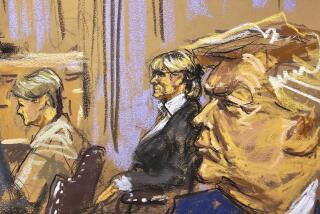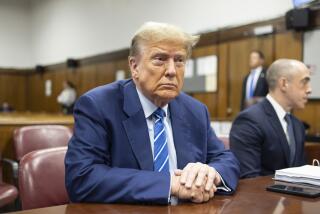Trump’s lawyers are heading back to court to revive his foreign travel ban

President Trump will try to break his losing streak in court today. (May 8, 2017) (Sign up for our free video newsletter here http://bit.ly/2n6VKPR)
Reporting from Washington — President Trump will try to break his losing streak in court on Monday when his lawyers go before the U.S. 4th Circuit Court of Appeals in Virginia and urge its judges to revive his temporary ban on foreigners arriving from six majority Muslim countries.
It is “extraordinary,” they argue, for a U.S. district judge in Maryland to have issued a nationwide order that blocked an executive action “taken by the president of the United States at the height of his powers.”
They were referring to the chief executive’s historically broad power to restrict migrants, refugees and visitors from entering the country.
But the judge in Maryland was not alone when he blocked Trump’s revised travel ban on March 16. The day before, another U.S. district judge in Hawaii handed down a similar decision, which the administration has appealed to the 9th Circuit Court on the grounds it was “extraordinary” and “fundamentally wrong.”
The two appeals — before the 4th Circuit on Monday and the 9th Circuit in Seattle on May 15 — set the stage for what may be an early decision from the Supreme Court on the scope of Trump’s power over immigration, assuming the circuit courts’ decisions are appealed by the losing side.
At issue is whether the president has essentially a free hand to restrict foreigners from entering the country or if his power is limited by the Constitution’s protections for due process of law and religious freedom.
Trump’s lawyers are not likely to find a friendly forum in the two appellate courts. Both have a solid majority of Democratic appointees. And 4th Circuit may hear the case without its most prominent Republican appointee, Judge J. Harvie Wilkinson III, who is expected to recuse himself because his son-in-law, acting U.S. Solicitor General Jeffrey B. Wall, is arguing for the government.
The administration’s lawyers are likely more focused on getting the case to the Supreme Court, where they have reason to be confident with the arrival of new Justice Neil M. Gorsuch, restoring the court’s 5-4 majority of Republican appointees.
For their part, those challenging the president’s executive order say it remains a scaled-down version of the Muslim ban that Trump promised during the campaign.
“We think the case is not complicated. The question is whether it is consistent with the Constitution that the government can condemn you because of your religion,” said Omar C. Jadwat, an ACLU attorney who is arguing the case in the 4th Circuit.
In the first round of this litigation, Trump and his new legal team suffered an early knockdown. On Jan. 27, after one week in office, the president issued an executive order restricting foreign travel that was immediate, sweeping and confusing. It led to chaotic scenes in airports when foreign students, professors, tech engineers and family members who were living or working in this country were caught off guard when they returned from overseas.
A wave of lawsuits followed, and a week later a judge in Seattle put the executive order on hold. The 9th Circuit upheld his decision on Feb. 9, dealing the Trump White House a major legal defeat in its third week on the job.
Trump’s team retreated and then issued a significantly scaled-back version on March 6. It temporarily suspends entry of foreign nationals from six countries (Iran, Syria, Sudan, Libya, Somalia and Yemen). And unlike the first and more sweeping order, the new ban “affects only foreign nationals who are outside the United States and lack a visa,” the administration said, and these “individuals have no constitutional rights regarding their admission.”
But those arguments failed to sway the two district judges. In Maryland, Judge Theodore Chuang said several plaintiffs had standing because they had relatives in the six countries who could be affected by Trump’s order. He cited Trump’s campaign statements as evidence of the president’s “animus toward Muslims.”
His words “present a convincing case that the first executive order was issued to accomplish, as nearly as possible, President Trump’s proposed Muslim ban,” he wrote in his March 16 decision. “These statements continue to explain the religious purpose behind the travel ban in the second executive order.” He suspended enforcement of order on the grounds it “violates the Establishment Clause” of the 1st Amendment, which he said prevents the government from favoring one religion over another.
Judge Derrick Watson in Hawaii also agreed with plaintiffs that the revised travel ban was “motivated by anti-Muslim bias” and therefore violated the 1st Amendment.
The two sides in the dispute spent quite a bit of time arguing over a 2005 Supreme Court decision that struck down display of the Ten Commandments inside county buildings in McCreary County, Ky.
When the ACLU first sued over the plaques featuring the commandments, the county responded by adding framed copies of the Magna Carta, the Declaration of Independence, the Mayflower Compact and the lyrics of the Star Spangled Banner. Attorney for the county then argued in court that these displays were about the “foundations of American law,” not about promoting religion.
Justice David Souter, writing for the high court, said judges are not so easily fooled. “Reasonable observers have reasonable memories,” he said, and they need not “turn a blind eye to the context” of the legal dispute.
His opinion in turn was cited by the plaintiffs’ lawyers in the matter, and by the two district judges, as the basis for saying courts should not ignore what might be the underlying purpose behind Trump’s revised travel ban targeting the six Muslim majority nations.
The administration’s lawyers insist that the dispute has nothing to do with religion. “The order does not convey a religious message. It no longer contains any reference to religion, and its secular, national-security purpose is set forth at length,” they said in their appeal.
Further, it is a mistake, they said, to “simply plop Establishment Clause cases from the domestic context,” involving local religious displays, and extend them to matters of “foreign policy, national security and the immigration judgments of the president.”
Twitter: DavidGSavage
More to Read
Get the L.A. Times Politics newsletter
Deeply reported insights into legislation, politics and policy from Sacramento, Washington and beyond. In your inbox three times per week.
You may occasionally receive promotional content from the Los Angeles Times.











